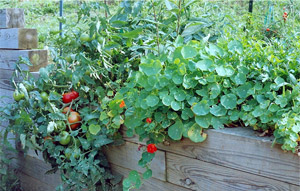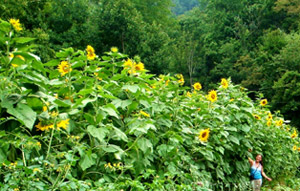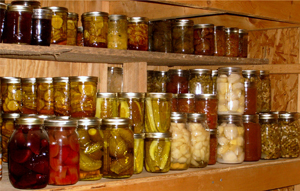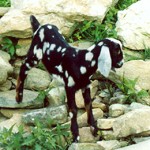
There’s a wonderful, gentle rhythm to the seasons of farming, and we’d love to have you join us through the year. In the spring there’s plowing with the horses and planting the crops, and the arrival of lambs and kids, sometimes while it’s still snowing. In summer we’re tending the crops and harvesting vegetables most every day, picking fruits and wildflowers, shearing sheep, and welcoming new chicks and ducklings. In the fall we’re turning the garden and planting greens, tying up cornshocks, gathering apples and nuts, and putting away the potato crop under beds of straw. All winter we’re smoking bacon and hams. The orchard and garden sleep under the snow, which brings nutrients rich as any fertilizer. Before long the crocus and daffodils burst blooming out of the snow, and our spring rhythm begins again.
We love our farming life. As a 17th-century English verse describes it:
Self Sufficiency We’re not large scale commercial farmers, and we’re not “back to the land, off the grid” folks. We’re just regular people who are lucky enough to live and work on a small mountain farm. Our goal is to be good stewards and to tend this land that has been farmed by so many generations of Southern Highlanders. In doing this we’ve learned a secret long known to farmers: If you take care of your land,it will indeed take care of you. Randall Cove Farm is a typical Southern Highland farm, where it seems like the fields have more rocks than dirt, and there’s virtually no level ground. But this rocky soil is incredibly fertile, and the seasons are mild with plenty of rain. Without really striving for it, we find ourselves pretty close to self sufficient here on our mountain farm. And we feel lucky every day.
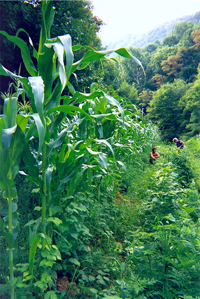 In the freezer we have our own pork, duck, chicken, goat, and lamb, as well as a whole Black Angus beef raised by our trail guide, Donnie Buckner. The lamb is the best quality I’ve ever tasted. We’ve started a flock of Guineas this year, too; Guinea fowl is delicious, and mountain women claim that their eggs make the richest cakes. Whenever we like we can fry our own trout-Rainbow, Brown, and native Brookies-as well as bluegill, bream, and crappie. We shear the sheep and llamas and sell the wool. While we don’t yet spin it, we can felt it into ropes for braided rugs. Down from the ducks fills our pillows.
In the freezer we have our own pork, duck, chicken, goat, and lamb, as well as a whole Black Angus beef raised by our trail guide, Donnie Buckner. The lamb is the best quality I’ve ever tasted. We’ve started a flock of Guineas this year, too; Guinea fowl is delicious, and mountain women claim that their eggs make the richest cakes. Whenever we like we can fry our own trout-Rainbow, Brown, and native Brookies-as well as bluegill, bream, and crappie. We shear the sheep and llamas and sell the wool. While we don’t yet spin it, we can felt it into ropes for braided rugs. Down from the ducks fills our pillows.
Our hens provide more than enough eggs, of wonderful color and flavor. From our goats’ milk we make yogurt and our own cheeses-chevre, fromage blanc, feta, queso blanco, ricotta, and mozzarella so far, and we’re working on brie and hard cheeses now. When the cow calves this winter we’ll have Jersey milk and cream, not to mention cow’s milk cheeses, creme fraiche, clotted cream, and butter. We make our own bread, too, to go with all that dairy wealth!
In the gardens we grow over 60 varieties of fruits and vegetables, more than enough for ourselves and for 50 guests when they stay in our cabins. There are white, red, and blue potatoes; onions, beets, and sweet and field corn; lettuce, cucumbers, and a dozen heirloom tomato breeds; heirloom green beans, “cornfield” beans that run up the cornstalks, butterbeans, and Greasy Cut Short beans; a bounty of asparagus; Sugar Snap and English peas; okra, eggplant, zucchini, and summer squash; red, green, yellow, and purple sweet peppers plus poblano, hot, and banana peppers; broccoli, Brussels sprouts, and cabbage. There are cantaloupes, watermelon, pumpkin, and heirloom Candy Roaster squash. From Fall to Valentine’s there’s spinach, kale, and Swiss chard; collards, creasy, mustard, turnip greens-and turnip bottoms-and rape. The herb garden provides rosemary, half a dozen thymes, marjoram, several oreganos, parsley, cilantro, lemon balm, a variety of sages and basils, catnip, celery-tasting salsify, and nasturtiums for salad. All summer long the garden is graced with flowers for armloads of cutting. The sunflowers tower ten feet tall, and yield hundreds of heads for birdfeeders, livestock feed, and delicious snacks.
We freeze, can, pickle, and dry what we can’t eat right away. Cucumbers, cabbage, beets, peppers, and onions become sauerkraut, pickles and relishes. Beans are canned, dried whole as Leather Britches, and dried shelled for Navy Bean soup. Hundreds of Roma tomatoes are dried and put up in olive oil, and we put up our own salsa, too. Corn, greens, peppers, squash, and okra are frozen ready for dinner. We even make “capers” from nasturtium seeds.
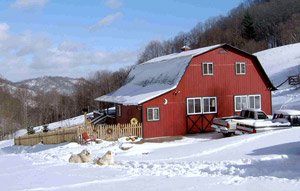 We have apples, peaches, blueberries, strawberries, red currants, rhubarb, blackberries, and raspberries. Next year as the orchard matures, there will be three or four varieties each of cherries, plums, nectarines, apricots, figs, pears, and grapes. Several more varieties of peaches will begin bearing, as well as over twenty-five heirloom apple breeds. We put upjams and preserves from the fruits, and we freeze and can apples for pies and for the Southern Highlander favorite, apple stack cake. Thanks to neighbors we have local molasses and honey. We even have the occasional offer of “homemade spirits”-the traditional “white” which is prized for celebrations and for warding off colds, and “brown” which is aged in oak, smooth and mellow, and rivals the best Kentucky bourbon.
We have apples, peaches, blueberries, strawberries, red currants, rhubarb, blackberries, and raspberries. Next year as the orchard matures, there will be three or four varieties each of cherries, plums, nectarines, apricots, figs, pears, and grapes. Several more varieties of peaches will begin bearing, as well as over twenty-five heirloom apple breeds. We put upjams and preserves from the fruits, and we freeze and can apples for pies and for the Southern Highlander favorite, apple stack cake. Thanks to neighbors we have local molasses and honey. We even have the occasional offer of “homemade spirits”-the traditional “white” which is prized for celebrations and for warding off colds, and “brown” which is aged in oak, smooth and mellow, and rivals the best Kentucky bourbon.
In the wild we harvest blackberries, black raspberries, wild strawberries, several mints, and wild grapes. We saute morel mushrooms, branch lettuce, and wonderful garlic-onion ramps. Lamb’s quarter, dandelions, and wild chicory enliven our salads. In the winter we have a huge stock of sweet black walnuts to crack, and neighbors share their chestnuts.
We split our own Locusts for fence posts, and cut cord after cord of firewood. We saw our own poplar, walnut, and oak for lumber. We stack our own stone for walls. Every pasture flows with water from springs and creeks. Our well gives 54 gallons a minute of sweet water that needs no filter. And our earth yields rubies, sapphires, garnets, rose quartz, and smoky topaz, not to mention a bit of gold. We are truly rich in many ways, the least of which is gold.

